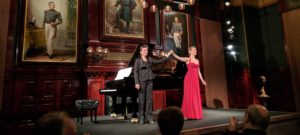
Review: Sabine Devieihle Makes a Shimmering NYC Debut
By James Monroe ŠtevkoHalfway through the recital opener, Berlioz’s Villanelle from “Les nuits d’été” questions arose as to why Sabine Devielhe is only just now making her New York City debut. The soprano has run rampant in Europe, with numerous albums, signed exclusively with Erato.
On this night the program, which Devieilhe spoke passionately on, was based on the artist Pauline Viardot, sibling of the famed Manuel Garcia Jr. Viardot who was a Renaissance woman – a singer, composer, pianist, and teacher. Pieces of the night included those composed by Viardot herself, those written for her, and others written by friends and contemporaries.
Following slamming of two giant, sliding doors, Devieilhe welcomed us to enjoy the concert as if we were in the salon of Viardot, as she motioned to point out the grand decor of the Park Avenue Armory’s intimate hall. With dark wood, looming paintings of 19th-century militia and wrought-iron chandeliers composed of leftover spears; the image of a French salon was hardly a stretch for the imagination.
A Diva To Remember
Devieilhe’s and her accompanist, Anna Le Bozec, showcased their expertise and refinement in this expertly curated concert. The soprano, with leather-bound book, delivered each piece with intent, emotion, and meticulous thought while remaining completely cool. She sang and made eye contact with the full hall of audience members, as if she were speaking to each of us privately.
Devieilhe’s voice shows incredible balance through her entire register. Equally bright and rich, there was never a moment throughout that showed a weakness on one side of the staff or the other. To boot, she has a palette of colors at her disposal, brandishing more heft in Mendelssohn’s “Neue Liebe”, or conversely, her sinewy, translucent sound at the opening of Lerchengesang by Brahms, “ Ethereal, distant voices…”
Program as Work of Art
The program’s chosen selections was a work of art itself. With an overarching theme of French chanson and a healthy mix of Italian and German additions, the program brought to the surface many great works that otherwise may not be known outside of recital enthusiasts.
“Vaga luna” by Bellini, not the most chosen bel canto art song, was the sole Italian offering; sung with an innocent lightness. Devieihle took on the sound and aura of a young, Italian teenage girl with the first feelings of a young lover.
Technical prowess aside, the soprano is first and foremost a storyteller, making Berlioz’s “La mort d’Ophelie” one of the most perfect choices on the program. Devieihle’s ability to, not sing, but tell us a story is what made the ballade of this sad, watery, Shakespearean death really transport us to the scene of the crime. Ernest Legouvé’s text gives any intelligent singer the perfect, arching monologue, taking bystanders from beginning to watery end.
Massenet, coming into the spotlight with a cantata written expressly for Viardot was represented with Manon’s “Je suis encore tout étourdie.” Technical feats dazzled here; her coloratura breathed a life of its own. Climbing to an excited squeak which contrasted with the previously mentioned “Neue Liebe,” so light, soft, and clean it sounded like a baby’s fingernail on a wine glass.
Pianist Le Bozec was on par, matching the soprano’s gift of an endlessly twisting, legato line or twinkling as finely as the voice’s exotic leaps within various cadenzas. The two are an obvious well-paired duo with an incredible feel for one another on the stage. Le Bozec was the centerpiece for “Hai Luli,” composed by Viardot, which was the least interesting on the program but offered great accompaniment as a backup. Perhaps the most powerful, yet modest, of the accompanists moments was sewing of the image of spinning stars, in Brahm’s “Lerchengesang” a short piece, but one that says so much in its lightness. Each finger, twinkled in its own uniqueness, like snowflakes. The lark singing as it soars on among the fading stars in the dawn’s light.
Another composition by Viardot was the “Cossack Lullaby”, originally written in Russian, was later translated to its current French. Here, singing as a mother, Devieihle’s voice at times mourned over her child, with lyrics of “I live my life in tears, there is no peace for me.” The text by Mikahil Lermontov is appropriately very maudlin, with it’s roots in Slavic life.
To appease the ever-hungry audience, Devieihle delivered four encores including Debussy and the haunting favorite, Rachmaninoff’s “Vocalise.” On the whole, this was a recital not to be missed and New York City should have been watching this Sunday and Tuesday at the Armory, as Devieilhe needs to be welcomed back stateside, tout suite!


